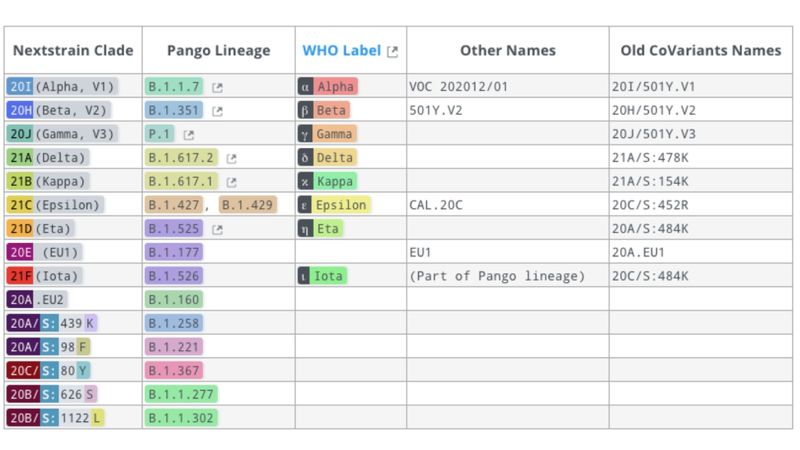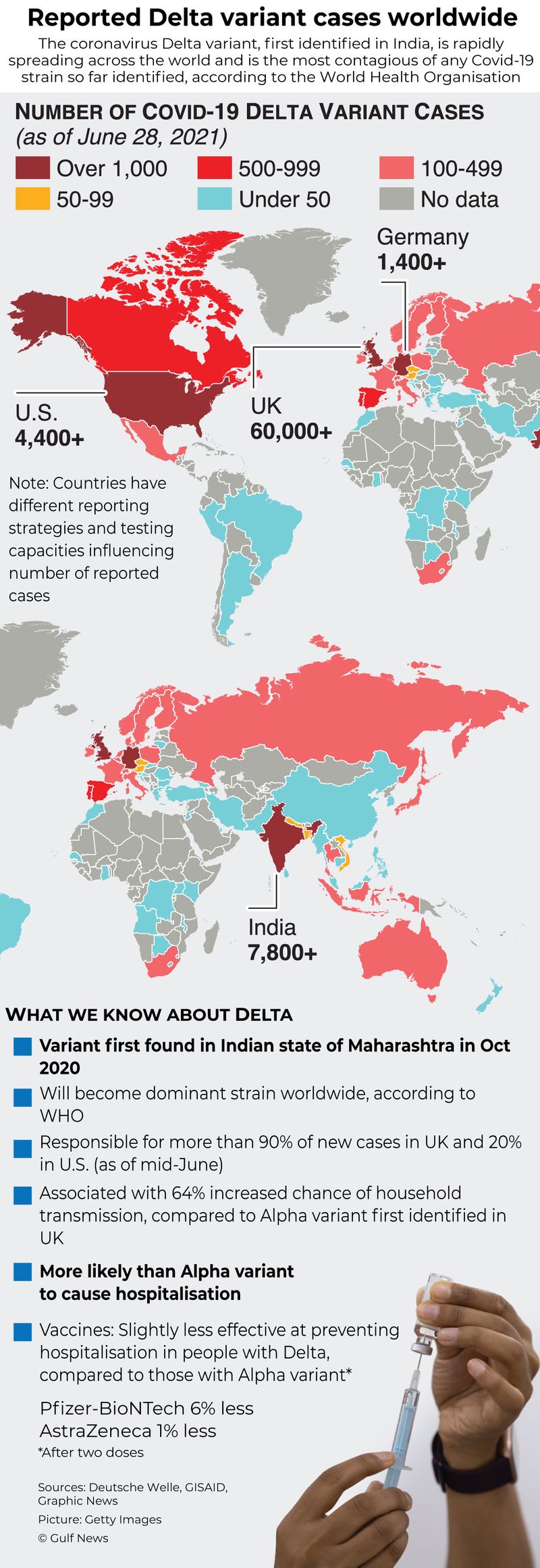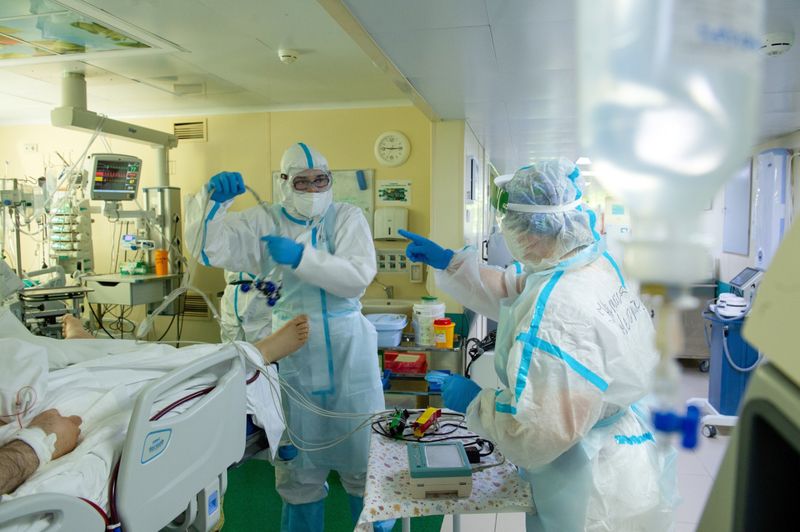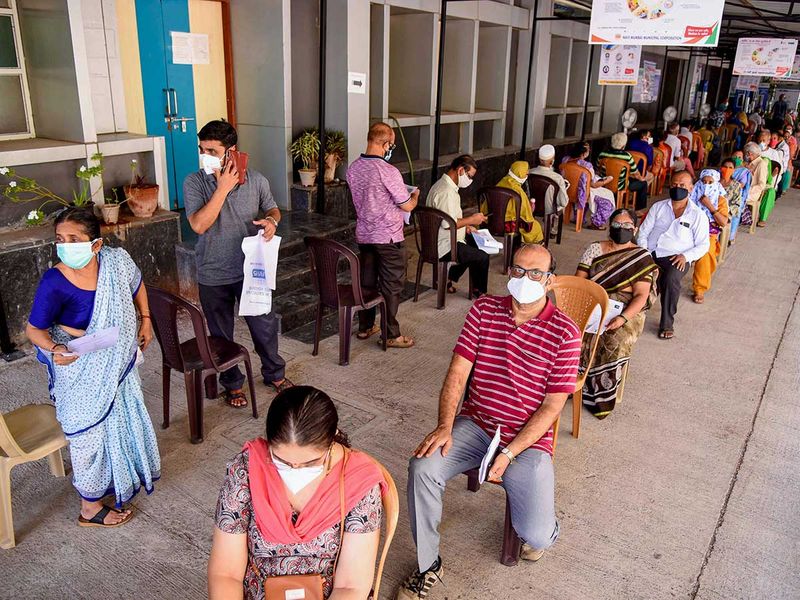Dubai: Multiple variants of the virus that causes COVID-19 have been documented globally. Information about the emerging SARS-CoV-2 variants and the small differences that set them apart are changing rapidly. Scientists are working to learn more about how easily they spread, how severe is the illness they may cause, and whether authorised vaccines will protect people against them.
Since the start of the pandemic, and thanks to advances in genome sequencing, these small differences — or variants — have been identified and studied. Here’s what we know so far about the so-called "variants of concern (VoC)":
Alpha, Beta, Gamma, Delta, Delta +, Kappa, Epsilon, Eta, Iota variants: Who gave them those names?
When the World Health Organisation (WHO) named the illness caused by SARS-CoV-2 as COVID-19 (Coronavirus Disease-19), it was an effort to avoid stigmatising the virus' origins in terms of population, geography, or animal association.
The world body had learnt from experience: there was a tendency to link an illness to the place it came from — Spanish flu, West Nile virus, Middle East Respiratory Syndrome, to name a few. This could be misleading, and in some cases inaccurate. WHO’s move was successful till COVID-19 variants came along.
Soon variants coming out of South Africa, Brazil, India and the UK were called by the countries they came from. There was another problem — scientific names. When researchers in South Africa spotted a highly mutated strain of coronavirus in late 2020, they called it variant 501Y.V2. Naming schemes developed by other scientists called it B.1.351, 20H/501Y.V2 and GH/501Y.V2.
Yet others called it ‘the South African variant’. Once again, WHO came to the rescue to quell confusion and avoid geographical stigma. According to a naming scheme announced on May 31, it was called ‘Beta.’
90 %
Delta is seen dominating the 2021 Summer wave of COVID-19 cases in the EUThe new names given by WHO, taken from the Greek alphabet, were not meant to replace scientific labels, but to serve as an easy reckoner for policymakers and the public at large. Variants will be assigned letters of the Greek alphabet in the order in which they are designated potential threats by the WHO.
What do the names mean?

Think about a virus like a tree that grows and branches out. Each branch is slightly different than the others. Scientists compare the branches and label them according to differences found. Since the start of the pandemic, when the genetic sequence from samples taken from the first patients in Wuhan was published, scientists have studied and identified these small differences — or variants.
Why are they called “variants of concern” (VOC)?
VOC is a category used when mutations are also being linked to rapid spread in human populations. Other terms include "variant of interest" (VOI) or "variant under monitoring" (VUM), following the WHO definition. They are concerning not only due to the fact that the are seen as highly transmissible, competing to take over altogether on a worldwide basis, but . Greek letters to each variant:
- Alpha (B.1.1.7), first reported in Kent, UK in December 2020
- Beta (B.1.351), first reported South Africa in October 2020
- Gamma (P.1), first reported in Manaus, Brazil in December 2020
- Delta (B.1.617.2), first reported in Maharashtra, India in October 2020
- Epsilon (B.1.427, B.1.429), first detected in California in September 2020
- Eta (B.1.525), first detected in New York in November 2020
- Iota (B.1.526), first detected in York City in November 2020
On June 1, 2021, the WHO has said only Delta (B.1.617.2,) one of the three strains of the B.1.617 SARS-CoV-2 variant first detected in India, is a “VOC” now. Lower rates of transmission have been observed for the other two lineages.
Kappa (B.1.617.1) strain, which was also first detected in India, has been downgraded/reclassified to a Variant of Interest (VOI), as global prevalence appears to be declining, though it has also shown increased transmissibility. The B.1.617.3 lineage, on the other hand, is "no longer classified as either a VOI or VOC – as few reports of this variant have been seen till now.

Delta, up to 60% more transmissible than the already highly infectious Alpha, has triggered a "third wave" of infections in countries like the UK, forcing delays in full reopening of society. In the US, the Delta variant is gaining foothold and spreading rapidly. It's doubling every week, CDC warned, and could trigger a fresh wave of infections in southern US states, where vaccine uptake is low. Nature moreover warned that in countries without large vaccine stocks, particularly in Africa (where less than 1% of the population had been fully vaccinated), the variant could be "devastating".
What are the most common variants found in the UAE?
Dr Farida Al Hosani, official spokesperson for the UAE health sector, said the three COVID-19 variants that have been recently detected in the country include the following:
- Alpha
- Beta
- Delta
Currently, these are also the most common mutated variants detected in many countries worldwide.
What challenges do the new variants pose:
The biggest challenges right now can be summed up in just two major courses of action:
- Ramping up vaccinations across the world.
- Adhere to social distancing protocols, especially among the unvaccinated.

Both are easier said than done. Another bigger challenge is premature opening up. For example, one study published in Nature on June 8, 2021 suggests that the resumption of travel in Europe from June 2020 may have contributed to the rapid spread of the SARS-CoV-2 variant in Europe that summer.
What about reinfections after vaccination?
To answer this question, experts cite data from a population surveillance study in the UK, showing that genomically documented COVID-19 reinfections are "rare", and even more rare are ones that are serious. One study shows ≤ 0.4% reinfection rate out of 4 million cases was dubbed as "good news". "It tells us prior covid immunity is solid (but even stronger w/ 1 dose vaccine)...This will help #BlockDelta," said Dr. Eric Topol, professor of molecular medicine and founder-director of the Scripps Research Translational Institute, Medicine, and Executive Vice-President of Scripps Research.
Do vaccines work against all these variants?
Yes, according to a Lancet study, which measured neutralising antibody (nAbs) levels against the variants of concern by the BNT162b2 vaccination (Pfizer). High levels of nAbs show they work across all the variants, including Delta and Beta, providing protection from illness, hospitalizations, and deaths. "The good news is that we have vaccines that can protect from all the variants that have emerged to date. The bad news is delta, the worst we've seen so far," stated Dr. Topol.
Dr Farida Al Hosani said the authorised COVID-19 vaccines have been effective in curbing severe infections, though it does not prevent them completely.
How dangerous are the Delta and Delta + variants?
The Delta variant’s mutations make it more transmissible and help evade the body’s immune response. “Most studies indicate Delta is 50-60% more transmissible than the Alpha variant. The Alpha variant itself was nearly 50-60% more transmissible than the original strain,” Quartz India quoted Dr Bhramar Mukherjee, associate director for quantitative data sciences at the University of Michigan Rogel Cancer Centre, as saying.
If a person infected with the original strain could infect two people, a person with the Alpha variant could infect four people. And one person with Delta variant is capable of infecting around seven people.

A study by India's National Centre for Disease Control and the CSIR Institute of Genomics and Integrative Biology said infections among those who had been vaccinated [with both doses] were "usually mild", and did not result in a higher rate of death.
Delta Plus has an additional mutation (K417N) in the spike protein of the virus. Indian researchers said the variant appears to be more transmissible, attacks lung cells faster, and less responsive to antibodies. There’s also concern that this strain may be more lethal since it could be resistant to drugs and vaccines.
Do Indian-made vaccines Covishield, Covaxin work against Alpha, Beta, Gamma and Delta variants?
Since all COVID-19 vaccines were developed for the original coronavirus strain, they may not fully safeguard against the Delta variant and other new variants. But recent studies have shown that the vaccines work against the Delta variant but with reduced effectiveness. The effectiveness against the Delta Plus variant is yet to be determined.
Public Health England’s study showed that two vaccines after two doses were “highly effective” in preventing hospitalisation. Its report said the Pfizer vaccines 96% effective and the AstraZeneca vaccine is 92% effective.
12
Number of states in India where Delta Plus variant has been found.
Since Covishield is essentially AztraZeneca manufactured in India, it should keep the Delta variant at bay. And AstraZeneca provides 55-70% protection after one dose and 65-90% after two doses. A booster dose is also being trialled for protection against the beta strain.
Covaxin was initially produced to keep out the original strain, but there are not enough data on its efficacy against other strains. The Indian health ministry said the indigenously-made Bharat Biotech’s Covaxin is effective against the Delta variant. It did not provide any data, but said that the extent and proportion of antibody titers produced by Covaxin will be shared soon.
What's the latest on the Delta Plus variant in India?
India has said that the Delta Plus variant of the coronavirus has been found in 12 states. The update, based on data given by Indian Council of Medical Research (ICMR), said 48 cases of the variant have been identified from more than 45,000 samples collected during April, May and June.
The ICMR also said that the Delta Plus variant is very localised in the country, adding that it has been isolated and cultured at National Institute of Virology (NIV) in Pune. Most of the cases of Delta Plus variant have been found in three states — Maharashtra, Kerala and Madhya Pradesh.
The ICMR also said that the Delta Plus variant is very localised in the country, adding that it has been isolated and cultured at National Institute of Virology (NIV) in Pune. Most of the cases of Delta Plus variant have been found in three states — Maharashtra, Kerala and Madhya Pradesh. The Maharashtra government has tightened restrictions, allowing essential shops to remain open only till 4 pm on all days.
Federal minister Jitendra Singh has urged medical professionals "not to create a panic" about a possible third wave of COVID-19 infection and stressed that the basic approach should be "precaution, not panic".
https://ift.tt/3jnje2Z






No comments:
Post a Comment